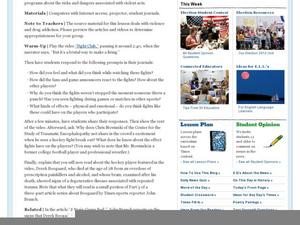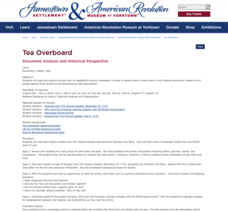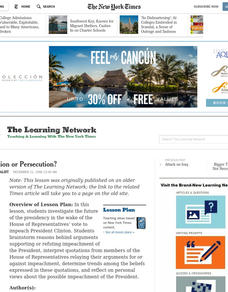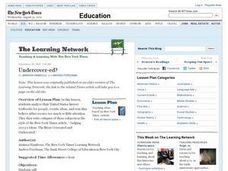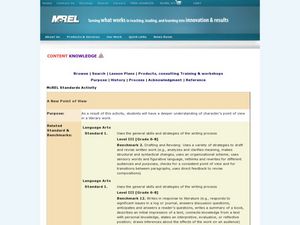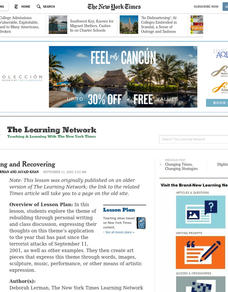Curated OER
Markup and Discount
Seventh graders observe and demonstrate how to calculate markups and discounts including markup percentages and discount percentages. They observe a teacher-led demonstration, then in pairs read scenarios and independently complete...
Curated OER
On 'Punched Out': Looking at Brain Trauma and Other Risks of Violent Sports
The tragic story of Derek Boogard, a hockey star whose sports-related brain injuries eventually lead to his death, is told through a series of videos. There are also articles that can be read. This poignant lesson gets participants to...
Jamestown-Yorktown Foundation
Tea Overboard
While less well known than the event in Boston, the Yorktown Tea Party was equally decisive in turning community sentiment against Great Britain. To gain an understanding of why the colonists objected to the Tea Act, young historians...
Curated OER
All the World's a Stage
Is the circus a form of theater? Read "A City of Clowns? What Else Is New?" to sway your class that a circus, is indeed, a theatrical performance. Critical thinkers compare/contrast various forms of theater and identify what makes the...
Curated OER
Not Just the Facts
Encourage your learners to explore the differences between hard news and news analysis. They outline a complex news analysis about the upcoming presidential election, then endeavor to write an analysis of the same topic, using local...
Curated OER
Don't Believe the Hype
Are hand sanitizers good for you? What about the environment? Research the science behind commonly used cold medicines. The class reads an article, creates a product poster, and conducts independent research on product claims made by...
Curated OER
"Old 300"
Fourth graders combine art and history to assess the importance of the "Old 300." They explore a group of colonists that Stephen F. Austin brought to Texas as the first settlers and then create a time line of major events leading to the...
Curated OER
The End?
This lesson asks young readers to predict what will happen to Harry Potter. While the question has been answered by the last book and film in the series, the concept and links provided by The New York Times’ Learning Network are...
Curated OER
Random Acts of Kindness For Kids
Develop a world-wide, email chain on which class members can showcase their acts of kindness. After defining the meaning of random acts of kindness through discussion and through a reading of Random Acts of Kindness,...
Curated OER
Don't Believe the Type: Internet Ethics
What is Internet fraud? Explore Internet ethics and engage in a collaborative discussion. In order to create a Guide to Internet Honesty, learners read and discuss the article "A Beautiful Life, A Tragic Death, a Fraud Exposed." Then...
Curated OER
Prosecution or Persecution
Investigate the future of the presidency in the wake of the House of Representatives' vote to impeach President Clinton. The class brainstorms both sides of the argument, reads and discusses an article, then analyzes and writes a journal...
Curated OER
Validating Votes
Explore the discrepancies in Florida's vote counting process in 2000 and 2002 with this New York Times reading instructional activity. Middle schoolers study the viewpoints presented in informational text, paying attention to how...
Curated OER
Undercover-ed
Have your class engage in critical-thinking activities using this resource. Learners discuss a variety of topics they think get too much, or too little, attention from the press. They analyze why these topics are over or underrated....
Curated OER
A New Point of View
Analyze point of view and how it affects a literary work with this lesson. Middle schoolers create a written piece that focuses on point of view. They review the literary term "point of view," and explore examples of the term in text....
Curated OER
Rebuilding and Recovering
What does it mean to rebuild and recover after a major event? Your class will explore this theme while they discuss and discover the events surrounding September 11. They will also look at other examples and then create art pieces that...
Curated OER
Direct Effect
Discover the damage that was caused by the terrorist attacks on September 11th with your class. They will learn about the events of that day and the litigation process for damages incurred that day. Their research will cover the various...
Curated OER
For The Sake Of Security: U.S.A. Patriot Act & Bill of Rights
A substantive New York Times article about the U.S.A. Patriot Act, military tribunals, racial profiling, and the Bill of Rights forms the basis for a discussion of the complex interplay of fundamental American rights and the aftermath of...
Curated OER
Strong Convictions
How can the rhetorical structure of an editorial help to develop its argument? Use this New York Times editorial to emphasize the importance of structure in a piece of informational text. Adolescent writers then use the editorial as a...
Curated OER
The Original's Sins
Are history textbooks plagiarized? The New York Times article, “Schoolbooks Are Given F’s in Originality,” looks at this question and forms the basis for a lesson plan on textbooks and plagiarism. The very detailed plan includes resource...
Curated OER
To Sleep, Perchance to Dream
Students examine their thoughts on the origin and meaning of dreams on a personal basis. They compare and contrast different models of the nature of dreams. They maintain a dream journal over a specific period of time.
Curated OER
Think First, Then Ask
Students are to read the book Everglades and create a KWL chart about the book. The KWL chart is explained to the students during the process of them reading the book. They complete step-by-step instructions to read the book and complete...
Curated OER
What's Fit to Print?
Students evaluate how newspapers are constructed and evaluate the extent to which newspapers serve their readers' interests.
Curated OER
Who Wants to Be a Thrillionaire?
Learners explore the investments undertaken by the "thrillionaire" Paul G. Allen, and propose future areas of high-tech scientific investment for Mr. Allen to pursue.
Curated OER
Living to Tell Their Tales
Young scholars explore ways in which the elderly can be valuable resources in learning about history. By conducting their own historical research through interviews with the elderly, students come to appreciate this resource first-hand.

